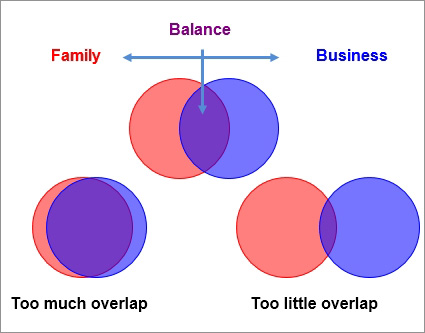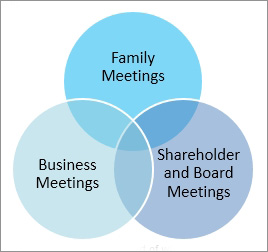How structure and shared vision can prevent family rifts from undermining a thriving enterprise
Key Takeaways:
-
It's not unusual for family businesses to put off dealing with issues as a way to maintain family unity.
-
When conflicts and challenges are not addressed directly, more issues inevitably arise.
-
Especially in startup companies, each working family member operates independently, with little structure or formal process to eliminate communication voids.
-
A family business needs three types of regular meetings to formalize expectations for the company: family meetings, business meetings and board meetings.
You have likely heard poet Robert Frost's proverb, "Good fences make good neighbors," from his 1914 poem, Mending Wall. When it comes to family business, I suggest that "formal structure supports family love.' Here's an example taken from one of my clients I'll call Jones Construction.
In 2008, a dad and his son started Jones Construction. You remember 2008. The Great Recession was challenging all businesses, especially construction. Yet, Jones Construction experienced wonderful financial success, growing from nothing to $7 million annually in 2012, with a $500,000 profit. On the outside, Jones Construction looked like a thriving business with remarkable prospects and a great future.
But inside...
The family was unhappy. The dad and his wife (the son's stepmother) and the son's wife were each engaged in the business. The stepmom was the estimator and the daughter-in-law was the bookkeeper. And the two women weren't speaking to each other. This strained the relationship between the dad and son, who had founded the company. They wondered, what happened? More important, they needed to do something to restore family relationships and maintain the company's success.
It's not unusual for family businesses to put off dealing with issues as a way to maintain family unity. Of course, what happens when issues are not discussed and resolved is that more issues arise, and this inadvertently creates the very problem that they are trying to avoid. As you would expect, the Jones family was no exception and had a long series of issues that needed to be resolved.
Family businesses, like all startups, need structure to grow
In my experience, family members in business generally love and care about each other. They try to do what's best for their company and to avoid fights. Especially in startup companies, each working family member operates independently, with little official structure or formal communication. This creates communication voids. Individuals make assumptions without a shared understanding. Small differences fester unresolved until they became painful and unmanageable.
Jones Construction was operating without a hand on the tiller. Many administrative decisions were being made by the bookkeeper without recognizing how they affected other parts of the company. Feelings were hurt. Complaints became personal. That's when I was called in - when feelings were raw and people weren't talking. The son was no longer going to family celebrations.
Believe it or not, this is not unusual. I might even say such situations can be expected in family businesses that run "on their own." Business and family issues overlap without oversight, and family entanglements upset business functions. Even "normal" business and financial differences can erode family relationships. That's because two separate systems - family and business - have become intertwined. Business activities erode family relationships, and family relationships put stress on the business.
Find the balance
Jones Construction needed to find, define and develop the balance. This is necessary so that a business family can be both a business and a family without one overly influencing the other.

When there is too much overlap, the business is vulnerable to family issues and entanglements that are normal in all our families. In addition, business differences often erode family relationships.
On the other hand, when there is too little overlap, it robs the business of all the positive qualities of the family culture. It's these positive qualities that contribute to family businesses outperforming the financials of companies in the Standard & Poor's 500 index. Family businesses are the source of most new employment and are also a major contributor to the gross domestic product.
The way to create balance between the two systems is to have structure and formality - something that Jones Construction needed to create. Typically when I suggest this, the client's response is, "We don't need all that corporate stuff, because we love each other." My response is, "It's because you love each other that you need this stuff."
Start by sharing

A family business needs three types of meetings to formalize expectations for the company:
-
Family meetings.
These begin first so that the family can discuss the expectations and operations of the company and the family's approach to it. It is also a way to manage the boundary between business and family. Everyone in the family is invited to family meetings, even those who may not be working in the company but are affected by its decisions. A lot can be accomplished in these meetings to bring understanding and healing and power to individuals as well as the entire family. Family meetings are one of the ways to create structure, formality and balance between the two systems. Family meetings are also the place where family members formulate their expectations for the company and communicate them to the board.
-
Business meetings.
These meetings are where the employees implement what the board has created in terms of the family's expectations for the business. Only company employees attend these meetings.
-
Shareholder and board meetings.
These meetings monitor and discuss the company's performance. This assumes that the company has specific, measurable processes and goals and that the board has real influence and governance. Only board members attend these meetings.
So you can see that family meetings are the heart of what continues into the business. They are the base for the business. Below is a summary of what family meetings are all about. I encourage anyone who has a family business to use this template as an opportunity to begin meaningful communications and catch little irritations before they become big fights.
|
Functions of Family Meetings
|
Create balance between the family and business system
|
Opportunities to build the emotional equity of the company
|
|
Creation of a Common Vision to unite the family
|
Shareholder Education
|
|
Family Unity
|
Celebration and renewal of family rituals
|
| Transparency | Creation of a Family Participation Plan/Code of Conduct (employment policy)
|
Creation of expectations for the performance of the company (ROI)
| Succession Planning Discussions
|
| Communication | Estate Planning Discussions
|
Career Planning (purpose)
| Wealth Preparation Planning
|
Management of Differences
| Philanthropy |
|
Benefits of Family Meetings
|
Family Harmony
|
As a family, living in gratitude
|
|
Business Success
|
Identify family values regarding wealth, philanthropy and service
|
|
Transparency
|
Successful Succession Plan
|
Successful Adult Children
| Have a strong sense of purpose (spiritual)
|
Family Skills
(Behaviors Necessary for Successful Family Meeting Communication and Management of Differences Skills)
|
Talking Skills (sharing
|
Management of Differences (problem-solving)
|
|
Listening (understanding)
|
Forgiveness (reconciliation)
|
Conclusion
The second part of this article will provide you with an insider's view of what transpired with Jones Construction and how the company turned itself around to become successful as a business family.
Read Formalize the Love in Successful Family Businesses - Part Two here.